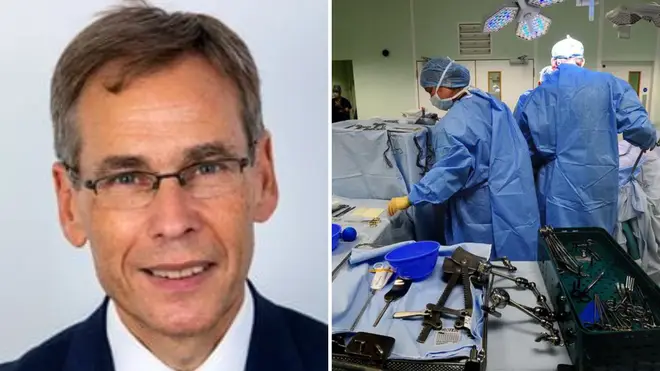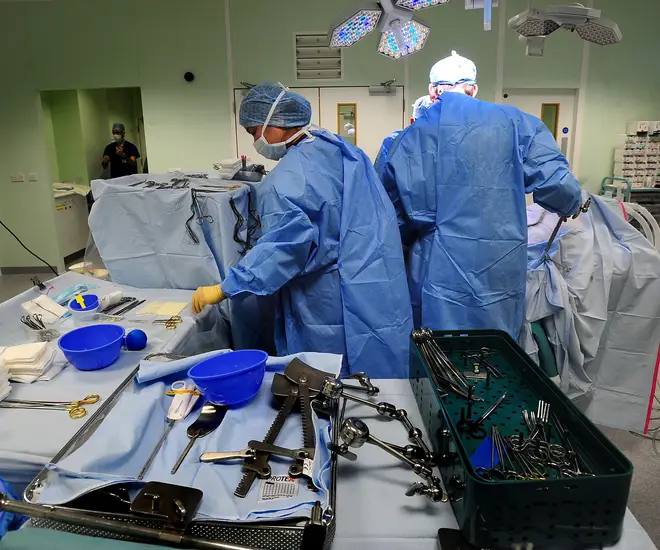
Paul Brand 10am - 12pm
12 September 2023, 14:33 | Updated: 12 September 2023, 14:36

The president of the Royal College of Surgeons has said that the problem of female surgeons being sexually assaulted at work needs to be "eradicated completely".
Tim Mitchell told LBC that he was "shocked and ashamed" at survey that found that nearly one in three female surgeons working in the NHS had been sexually assaulted in the last five years.
Some 29% of women who responded to the study had experienced unwanted physical advances at work. Over 40% had unwanted comments made about their body, and 38% had received sexual banter at work.
Surgeons who took part in the study, which was published in the British Journal of Surgery, reported eleven instances of rape.
Meanwhile almost 90% of women said they had witnessed sexual misconduct in the past five years. 81% of men said the same."

Caller Judith on her sexual assault working as a junior surgeon at the NHS
Mr Mitchell said: "I personally am shocked and ashamed to hear these stories. It’s absolutely essential that it’s dealt with and I think the whole service needs to apologise for the circumstances that have arisen and we need to deal with it appropriately and eradicate the problem completely.’
Mr Mitchell, who took office in July, said surgery may be plagued by sexual assault more than other parts of the NHS: "I think it’s the scale of the problem that’s been indicated by the report.
"We have reason to believe this may be more of an issue in surgery than in other branches of medicine, we’re still very male-dominated in surgery."
"Although we’ve been encouraging more women to come in to surgery, we still only have about 16% of consultant surgeons who are female."

‘Who was going to believe me?’ Caller shares memories of sexual harassment in the NHS.
The sexual assault study concluded: "Sexual misconduct occurs frequently and appears to go unchecked in the surgical environment owing to a combination of a deeply hierarchical structure and a gender and power imbalance.
"The result is an unsafe working environment and an unsafe space for patients."
After the report came out, female NHS workers told LBC they had witnessed unwelcome sexual behaviour in operating theatres.
Sonia from Leeds told James O'Brien she had seen "all kinds of behaviour" since she began working in the NHS in 1998.
“You get called out during the night, you get called out early in the morning… You are very vulnerable. You are an easy target,” Sonia said. “You are often walking around in the middle of the night on your own."

While Sonia said matters were improving for female surgeons in the NHS, she said there was still a culture of fear among workers, preventing them from reporting harassment by other, male surgeons.
"You think… ‘I don’t want to take it further, I’m not going to complain.’ Because then you work next to them… it won’t be such an easy work environment.
"You don’t want to hamper your advancements in your career."
The study was commissioned by The Working Party on Sexual Misconduct in Surgery - a group of NHS surgeons, clinicians and researchers who say they are "working to raise awareness of sexual misconduct in surgery, to bring about cultural and organisational change". It was conducted online from 1,436 responses and compiled by the University of Exeter.
Consultant surgeon Tamzin Cuming, who chairs the Women in Surgery forum at the Royal College of Surgeons of England, said the report presents "some of the most appalling facts ever to come out" about the field and "represents a MeToo moment for surgery".
Writing in The Times, she said: "Our research reveals an environment where sexual assault, harassment and rape can occur among staff working in surgery but allows it to be ignored because the system protects those carrying it out rather than those affected.
"We need urgent change in the oversight of how healthcare investigates itself.'
She called for the creation of a national implementation panel to oversee action on the report's recommendations and for incidents of sexual misconduct to be independently investigated.
She said: "No-one should need to call for a code of conduct that says, in essence, 'Please do not molest your work colleagues or students', and yet this is one of the actions our report recommends.
"The report is measured, its recommendations achievable, but this shouldn't disguise the anger and frustration felt by many in our profession."
The results have been presented to NHS England, the General Medical Council and the British Medical Association.